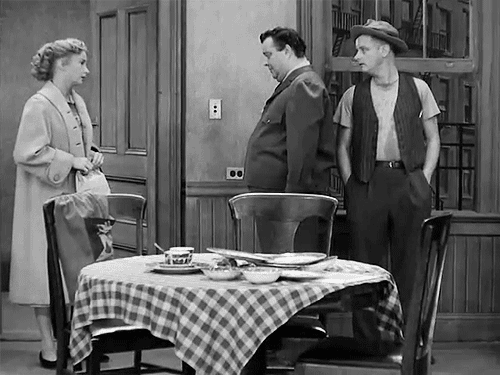In a beauty of a Baffler piece, Tom Carson, great stylist of the Magazine Era, thinks the bejeezus out of the history of families depicted on American TV sitcoms, what they used to tell us about ourselves and what they do now. I’ve always believed the best of the form were the shows you could imagine recalibrated with just a few small adjustments into deep drama, and I don’t mean a laugh-track–less Lou Grant at 10pm but rather Ted Baxter recognizing the dark night of his soul at 3 o’clock in the morning.
In one segment, Carson brilliantly dissects a classic, The Honeymooners, perhaps the closest thing to Beckett’s existential endgames that ever aired on U.S. television, its restless characters repeatedly running headlong into dashed hopes, diverted from utter defeat only by a hasty kiss so that the whole nightmare could be prolonged, played out again next week at the same time, same channel. An excerpt:
In the 1950s and ’60s, TV’s view of family was strikingly at odds with its view of marriage, which by default (thanks to the period’s taboos) was also its view of sex.
Midway between August Strindberg for hockey fans and Ubu Roi relocated to Eisenhower-era Brooklyn, that astounding show The Honeymooners was all about frustration and hostility. It was also presciently pro-feminist in its lampooning of men as big babies whose idiot dreams spawned messes their tuckered-out better halves were forever cleaning up. At the time, the Kramdens’ and the Nortons’ more reactionary counterparts were the Ricardos and the Mertzes on I Love Lucy, whose title character may have set back women’s lib twenty years. Her crazed aspirations to some sort of identity separate from or equal to her husband’s were the chucklesome proof she was a delightful dunce. Not least because she was a genius at it, I’ve always loathed Lucille Ball for turning herself into male chauvinism’s answer to Stepin Fetchit, especially since—off camera—she was one of the shrewdest and most resolute women ever to conquer showbiz.
In both those shows and others like them, the point was that husbands and wives were antagonists. Their dueling worldviews—and, by implication, incompatible sexual agendas—were the source of the comic friction. In TV terms, marriage was the war and children were the armistice. (For I Love Lucy, Little Ricky’s birth was the equivalent of the Peace of Westphalia.) The Honeymooners, God love it, never went that route, staying true to its name; when you think about it, the only other American classic with a title as acrid is Edith Wharton’s The Age of Innocence. That your head would explode if you tried to imagine Ralph and Alice Kramden as parents, or even Ed and Trixie Norton welcoming a little future sewer worker, is backhanded testimony to how intransigent the show was.•
Tags: Tom Carson

